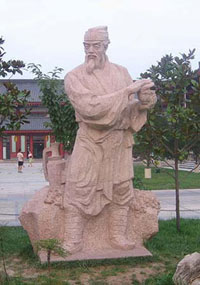The history of Chinese TeaTea Information:
The practice of drinking tea has had a long history in China, having originated there. Although tea originated in China, Chinese tea generally represents tea leaves which have been processed using methods inherited from ancient China. According to popular legend, tea was discovered by Chinese Emperor Shennong in 2737 BCE when a leaf from a nearby shrub fell into water the emperor was boiling. Tea is deeply woven into the history and culture of China. The beverage is considered one of the seven necessities of Chinese life, along with firewood, rice, oil, salt, soy sauce and vinegar. All tea originally came from China and from the same plant, Camelia Sinensis. The modern term "tea" der  A statue of Lu Yu. Xi'an, China
Legend also has it that the first people that cultivated tea were monks that wanted to stay alert during their meditation. To this day many teas have names that are related to monks. About 1200 years ago, The first book on tea "Ch'a Ching", circa 780 AD, was written by the Chinese author Lu Yu. It comprises three volumes and covers tea from its growth through to its making and drinking, as well as covering a historical summary and famous early tea plantation. There are many illustrations of tea making utensils and some say that the book inspired the Buddhist monks to create the Japanese tea ceremony. Lu Yu is recognized in China as the equivalent of the patron saint of tea. Chinese tea was the inspiration for many poems, paintings, and of course the incredible ceramics that have produced the worlds premier tea pots and tea cups. |
- Company Info
- About Us
- Chinese Tea Wholesale
- Site Map
- Links
- Customer Service
- My Account
- Chinese Tea Forum
- Contact Us
- Live Chat
- Company Policies
- Payment Methods
- Shipping Guide Return Policy
- Privacy Policy
- Terms of Use
- Tea Info
- The culture of Chinese Tea
- The history of Chinese Tea
- The types of Chinese Tea
- More Info...
- Join Our Community


- Falsi d'autore
- Gemälde reproduktionen
- Reproduction tableau


